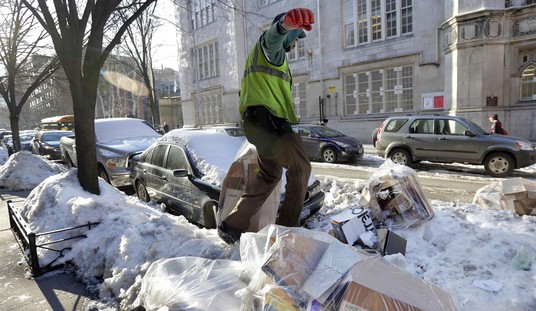On November 23, I reported here at PJ Media that American Saadiq Long was arrested in southeastern Turkey near the Syria border as part of an anti-ISIS terror sweep by Turkish authorities.
On December 10, Glenn Greenwald of The Intercept published a screed attacking my reporting, claiming I had “fabricated” the terror accusations “smearing” former Air Force veteran Long. Greenwald wrote that Long had merely been detained by the Turkish government over a misunderstanding over his visa and his longtime inclusion on the U.S. “no fly” list. PJ Media editors reinterviewed my sources, which Greenwald claimed by implication didn’t exist since I had “fabricated” my story, and publicly stood by my reporting.
That same day, Greenwald’s narrative was parroted by MSNBC’s Chris Hayes. During a segment on his program, he attacked other media outlets that had picked up our reporting on Long’s case.
This was not the first time that both Greenwald and Hayes reported on Saadiq Long.
In 2013, they both held up Long as an example of anti-Muslim discrimination by the U.S. government, which has kept and continues to keep Long on its “no fly” terror list.
Now, both a Justice Department filing in federal court — in response to a lawsuit by Long’s attorneys challenging his inclusion on the federal “no fly” list — as well as recent reporting by foreign media on the case confirm our original PJ Media reporting. (Perhaps not coincidentally, Long’s lawsuit was filed the day after Greenwald’s screed appeared.)
So far, the federal judge in the case has rejected Long’s requests for a temporary restraining order (TRO) and a preliminary injunction. The Washington Post reported Thursday that Long has reentered the U.S. based on a one-time waiver by the U.S. government to fly back into the country.
The Justice Department claimed in its filing that Long had previously repeatedly refused to accept the waiver offer, choosing to remain in Turkish custody — Long ended up spending two and a half months in a Turkish deportation cell.
The Post article also states that upon reentering the country, Long was subjected to hours of questioning by U.S. Customs authorities.
The Justice Department brief filed on December 17 by Deputy Assistant Attorney General Benjamin Mizer confirms that Long was arrested in early November in the city of Gaziantep in southeastern Turkey near the Syrian border — as PJ Media had reported — after Turkish National Police received a call on their terror tip line about the presence of Long and his family in the area. The brief also states that Turkish officials could find no information that Long and his family had entered the country legally.
A January 2 Arabic-language article published by Tahrir News added new details about Long’s arrest, noting that Long and his family had been arrested as part of a group of eight individuals, and added that the whole group was suspected of belonging to ISIS. This too matched PJ Media’s original reporting.
Tahrir News also reported that two of those arrested along with Long were known by Turkish authorities to be ISIS operatives, a detail no other media outlet had yet publicized.
Both the Justice Department brief in response to Long’s lawsuit and an attached declaration by a FBI legal attache in Turkey state that the arrest of Long and his family in Gaziantep occurred at the same time that Turkish National Police were making numerous arrests following an October 10 ISIS suicide bombing in Ankara.
It’s important context to note exactly where Long and his family were arrested.
Long’s attorneys — and Greenwald — claimed that Long was just looking for work and touring Turkey, where he had served in the U.S. Air Force.
But Gaziantep has for several years been known as an ISIS terror hub.
A U.S. official described Gaziantep to me as a “no-man’s land” for Westerners; the New York Times concurs. Last March, the Times published a dispatch from the city on ISIS movement through the area, and other international media have reported that Gaziantep was the crucial last stop for ISIS recruits entering Syria. Here’s how The New Yorker described the city back in December 2014:
This summer, ISIS was widely believed to have penetrated Gaziantep. In October, police, in two separate raids in Gaziantep Province, seized twenty-nine suicide vests, three hundred and thirty pounds of C-4 explosives, grenades and other explosives, and Kalashnikovs. Americans in Gaziantep have been warned that ISIS operatives are tracking the activities of Westerners. U.S. officials remain in the city only a few days, or even a few hours, as they carry out their missions. A senior State Department official who was visiting the city told me that if he came under attack there his only option would be to hide under his hotel bed.
Provably, little has changed in Gaziantep since 2014. One week after Long was arrested, 38 ISIS-bound foreign fighters were arrested there on their way to Syria. Another week later, five Turkish police officers were injured in an ISIS bombing in Gaziantep following a raid on an ISIS safehouse, where one occupant blew himself up rather than be taken alive following a shootout where four ISIS terrorists were killed by police.
That same day, al-Qaeda supporters openly drove through city.
Less than a month ago, Syrian documentary filmmaker and anti-ISIS activist Naji Jerf was assassinated in Gaziantep by suspected ISIS sympathizers.
Earlier this week, the Turkish military moved armored vehicles into the city following an ISIS rocket attack in the area that hit a school.
Gaziantep. An ISIS hotspot and active war zone where Westerners rightfully fear for their lives.
Glenn Greenwald and Long’s attorneys claim that Saadiq Long had simply taken his wife and kids there looking for job opportunities, doing a little tourism, when they were singled out on an immigration mix-up caused by anti-Muslim discrimination by U.S. authorities. Singled out as literally millions of people, including multiple terrorist groups and refugees, transited through the area.
Note that the U.S. government — offering Long only the one-time waiver to fly to the United States — is keeping Long on the “no fly” list, and is defending his inclusion on that list in federal court. By Long’s own admission, when he was allowed to fly back to Oklahoma from his then-home in Qatar to visit his ailing mother in 2013, he was subject to constant FBI surveillance and was refused by U.S. authorities to fly back to Qatar, forcing him to take a bus to Mexico to return home.
Considering the expense and effort, it would seem that the U.S. government has always believed it had a good reason beyond anti-Muslim bias to continue to monitor Long. Now, the U.S. government has additional information to consider along with whatever reason they had before: the man they had concerns about in 2013 was just arrested in an ISIS sweep in a known ISIS hotspot, an active war zone where the life of any Westerner is at risk.
Now that Saadiq Long is back in the U.S., will Chris Hayes feature him in a segment about how he was falsely smeared by “right-wing” blogs? Will Greenwald and Hayes pretend that our original reporting has not been confirmed, that the conditions and location of his arrest don’t render Long’s tale of job-seeking and Islamophobia not credible to a rational observer?
Will Greenwald continue to maintain that our original reporting on Long’s arrest in Turkey was “fabricated”?
There’s considerably more to Long’s arrest in Turkey than Glenn Greenwald and Chris Hayes have admitted. Their attacks on our reporting were the actual smear job.
Stay tuned.









Join the conversation as a VIP Member